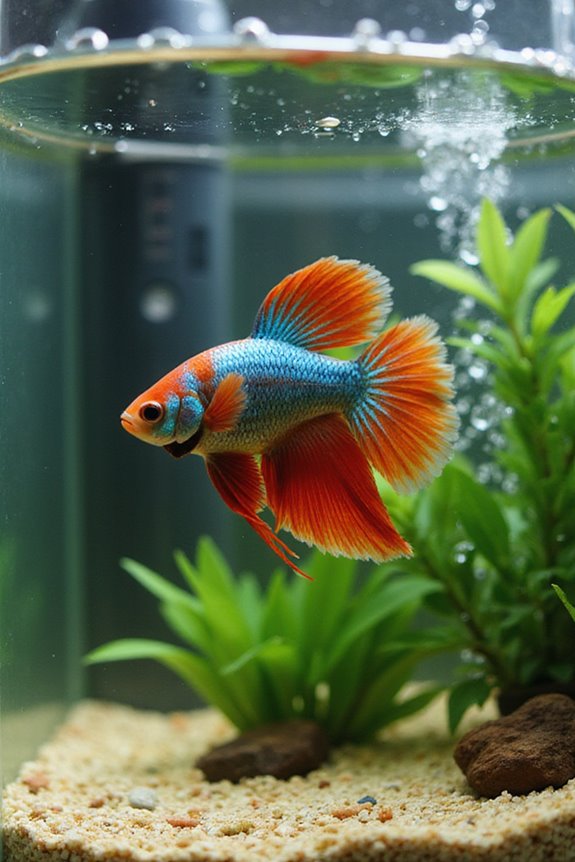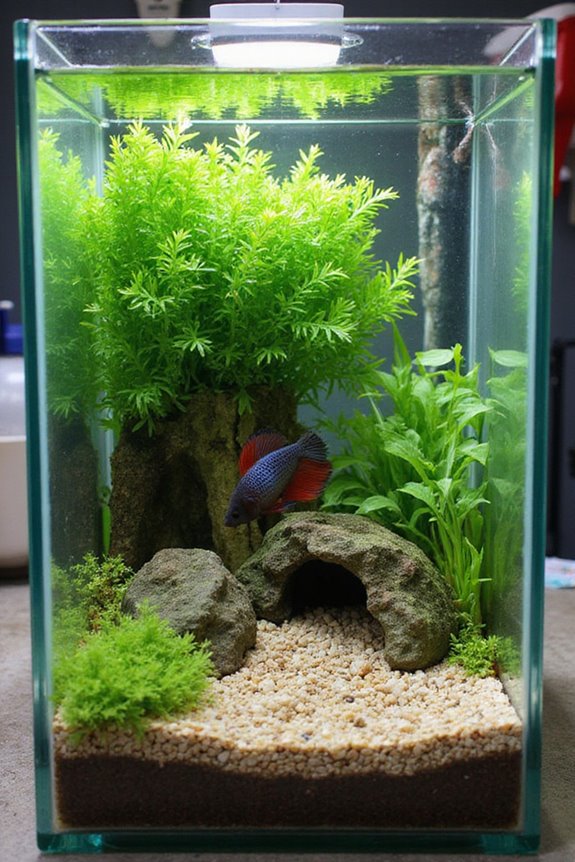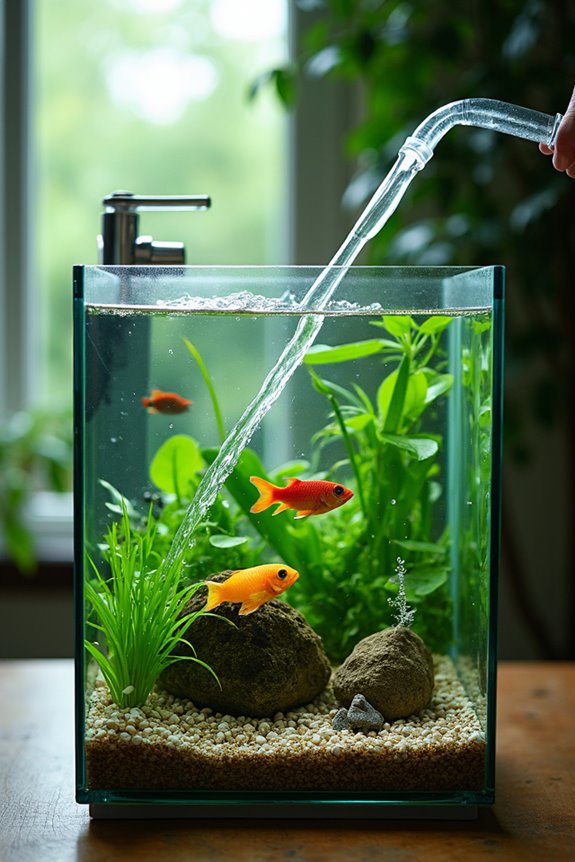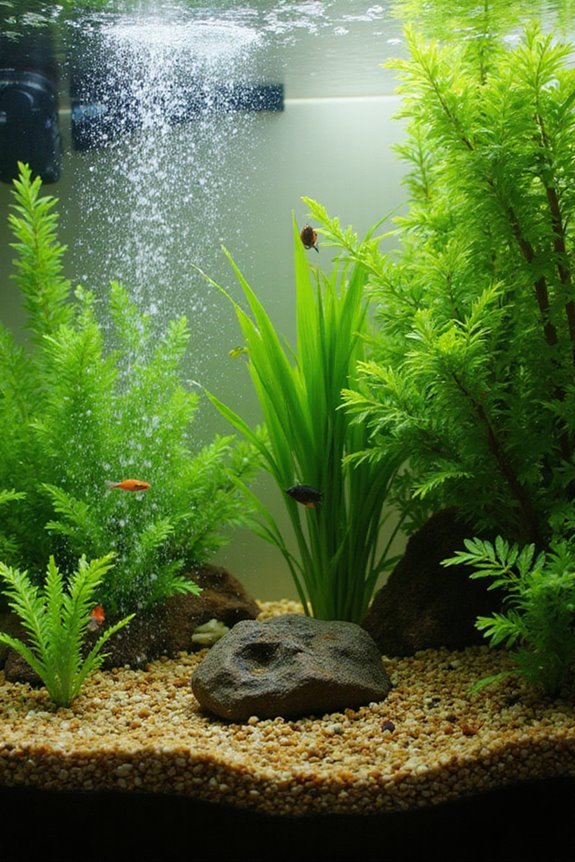Yes, betta fish need a heater to thrive. They prefer water temperatures between 76°F and 81°F. Use a reliable submersible aquarium heater to maintain a stable environment, ensuring the heater is near water flow for even heat distribution. Monitor temperatures with a digital thermometer to avoid fluctuations. Increased lethargy or hiding may indicate temperature stress. Choosing the right heater and maintaining ideal conditions is essential for your bettas’ health. More useful tips await you in this guide.
Key Takeaways
- Betta fish require water temperatures between 76°F and 81°F for optimal health, making a heater essential for maintaining stability.
- Fluctuating temperatures can stress bettas, leading to health complications, so consistent warmth is crucial.
- Aquarium heaters, especially submersible types, are effective for providing even heat distribution in betta tanks.
- Seasonal adjustments, such as using insulated covers in winter and fans in summer, help maintain appropriate temperatures.
- Signs of temperature stress include lethargy, hiding, and behavioral changes, indicating the need for temperature management.
Understanding Betta Fish Temperature Requirements
When it comes to providing the best environment for your betta fish, maintaining the right water temperature is essential. Betta biology indicates they thrive between 76°F and 81°F (24°C to 27°C), with a preferred range of 78°F to 80°F (25.5°C to 26.5°C). Water below 72°F slows their metabolism and weakens their immune system, increasing disease risk. On the other hand, temperatures above 82°F stress them and can be fatal. To manage this, I recommend using a reliable aquarium heater and thermometer. Place the tank away from windows to prevent temperature fluctuations. Just as anglers use layering techniques to regulate their body temperature in cold weather, you should monitor your betta tank’s temperature consistently throughout seasonal changes. Regularly check the temperature, especially during seasonal changes, to guarantee your betta stays active and vibrant. Proper temperature management directly impacts their health and overall well-being.
The Importance of Maintaining Consistent Water Temperature
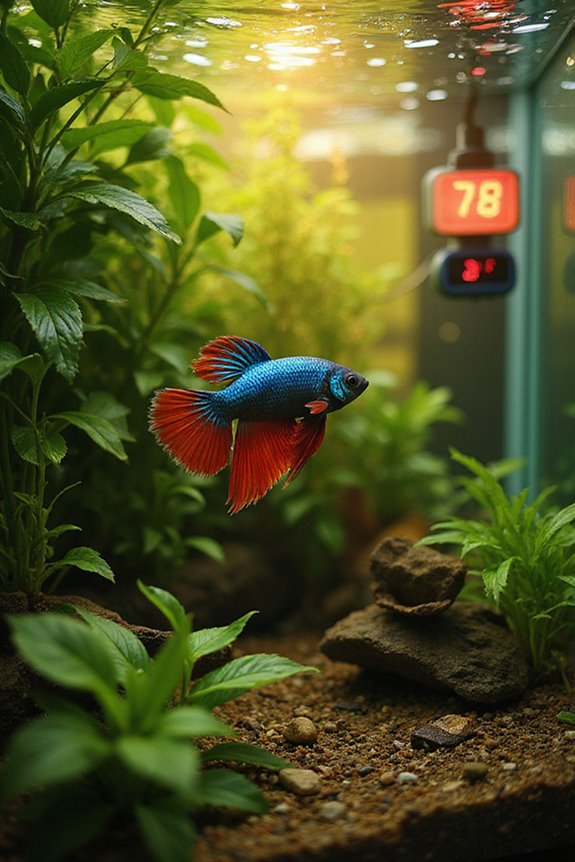
Maintaining a consistent water temperature is essential for the health and well-being of your betta fish, as fluctuations can lead to stress and various health complications. Temperature stability supports immune function, reducing susceptibility to diseases like ich and fin rot. When temperatures remain steady, bettas exhibit normal behavioral patterns, engaging in exploration and feeding. Additionally, metabolic efficiency improves within the ideal range of 76–81°F, preventing issues like constipation. For breeding, stable temperatures promote reproductive success by ensuring proper hormonal balance and reducing fry mortality. By investing in a reliable aquarium heater, such as an adjustable submersible heater, you can maintain this important consistency, ultimately enhancing your betta’s long-term wellness and health. Similar to how biodegradable fishing lines help protect aquatic environments from pollution, proper temperature maintenance safeguards your betta’s habitat from harmful conditions.
How Aquarium Heaters Work for Betta Fish
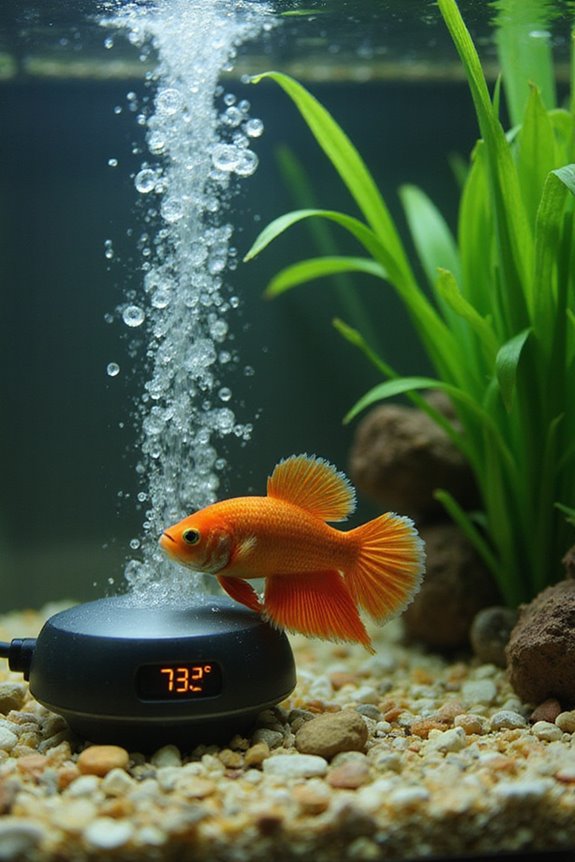
Aquarium heaters play a significant role in creating a stable environment for betta fish, ensuring that the water temperature stays within the ideal range of 76–81°F. There are various heater types available, such as glass tube, quartz tube, and titanium heaters. Each has its unique benefits, with quartz and titanium offering added durability. Heaters utilize different heating methods, including submersible models that heat water directly and in-line heaters that warm water as it flows through your filtration system. It is crucial to place heaters near water flow areas for even heat distribution, preventing cold spots. Additionally, modern heaters feature built-in thermostats and safety mechanisms to maintain stable temperatures and protect both your fish and equipment. For precise monitoring, consider investing in a separate digital temperature gauge with a waterproof rating of IPX7 or higher for accurate readings and durability in aquatic environments.
Species-Specific Temperature Needs for Bettas
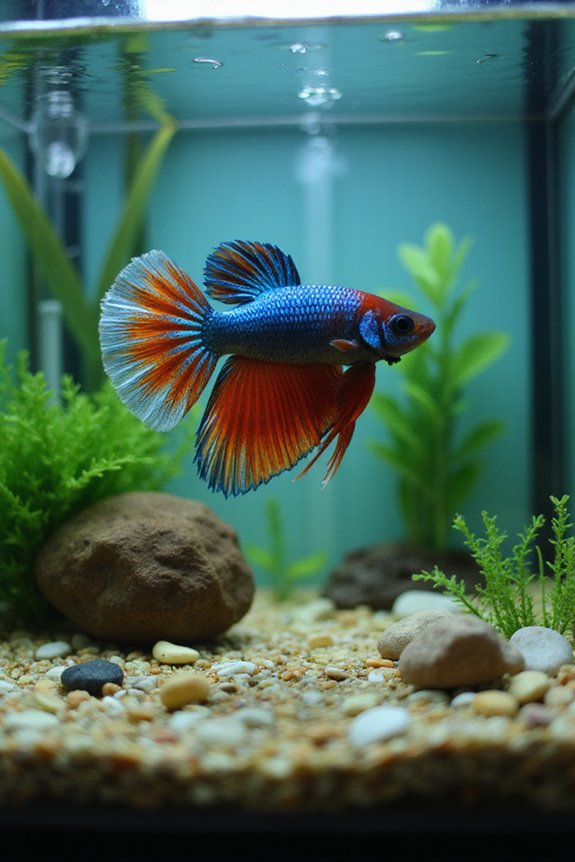
Understanding the specific temperature needs of different betta species is crucial for their health and well-being. Betta splendens, commonly known as the Siamese Fighting Fish, thrives between 78-80ºF (25.5-26.5ºC). While they can tolerate temperatures from 72-86ºF (22-30ºC), staying within their preferred range helps avoid stress. In contrast, Betta macrostoma, or the Spotfin Betta, prefers cooler conditions around 74-76ºF (23-24ºC) due to its native habitat’s cooler streams. To maintain these temperature preferences, using a reliable aquarium heater with an adjustable thermostat is essential. Regularly monitor the water temperature with a thermometer to prevent fluctuations, ensuring a stable environment that supports the specific needs of each betta species for peak health.
Seasonal Temperature Management Strategies
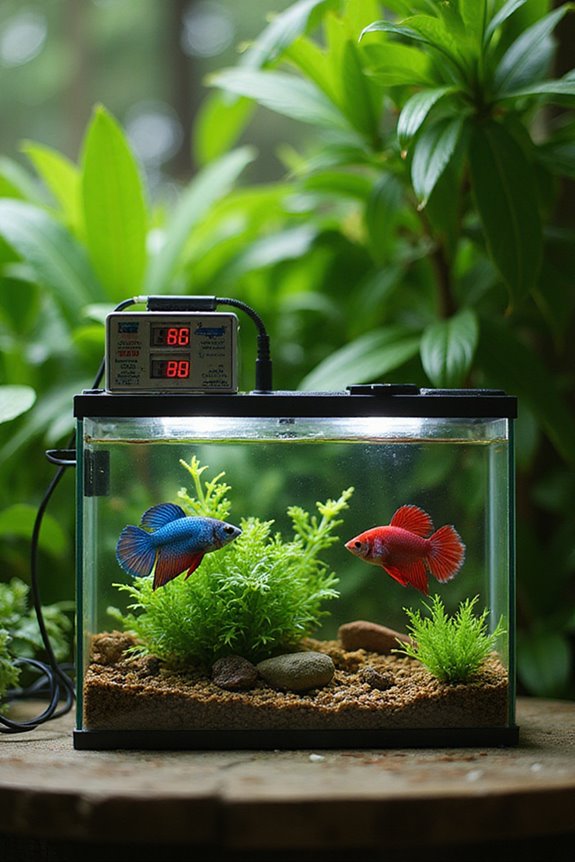
Seasonal changes can greatly impact the water temperature in your betta tank, which is why it’s important to have a plan for managing these fluctuations. During winter, I recommend using adjustable aquarium heaters with reliable thermostats to maintain a stable temperature between 75°F and 81°F. Insulated tank covers also help reduce heat loss. In summer, avoid overheating by keeping your tank shaded and using water circulation methods or fans to maintain even temperatures. For spring and fall, gradual temperature adjustments are essential—monitor the ambient temperature daily to anticipate necessary changes. Regularly check heater functionality and use digital thermometers for precise readings. Incorporating these seasonal care strategies guarantees your betta remains healthy and active throughout the year.
Signs Your Betta Fish Is Temperature-Stressed
When water temperatures become unstable, betta fish may exhibit signs of temperature stress that are vital for owners to recognize. Common stress indicators include lethargy, where your betta becomes less active, and hiding more often than usual. You might also notice behavioral changes like glass surfing—constantly swimming against the tank wall. A loss of appetite is another red flag, as well as bottom dwelling, which indicates something’s off. Physically, look for color loss or fin clamping. Rapid breathing and gill flaring are also signs of distress. Regularly monitoring water temperature and quality will help you catch these issues early. If you notice any of these symptoms, it’s imperative to act quickly to stabilize their environment.
Choosing the Right Heater for Your Betta Tank
Choosing the right heater for your betta tank is essential for maintaining a stable environment, as bettas thrive in warmer waters typically ranging from 76°F to 82°F. I recommend submersible heaters for consistent temperature control, and adjustable models allow for precise settings. For small tanks, compact heaters are ideal, while larger setups benefit from in-line external heaters. Remember to take into account wattage; a 25-watt heater is suitable for a 5-gallon tank. Proper heater placement near water flow helps distribute heat evenly. Regular heater maintenance, including checking for proper function and cleaning, guarantees reliability and longevity. Popular options like the EHEIM Jäger TruTemp and Marina Betta Tank Heater are highly recommended for their durability and accuracy.
Monitoring and Adjusting Tank Temperature
Monitoring and adjusting the temperature in your betta tank is essential for your fish’s health and well-being. I recommend using a high-quality digital aquarium thermometer, placing it on the opposite side of the heater to guarantee accurate readings. Check the temperature daily to avoid temperature fluctuations that could stress your betta. Position the heater near water flow zones for even heat distribution and consider insulating the tank walls in cooler environments. During seasonal changes, gradually adjust the heater settings to maintain stability. For emergencies, have a backup heater ready, and monitor the temperature more frequently if conditions are unstable. Automating temperature alerts via smartphone can help you respond quickly if adjustments are needed.
The Consequences of Improper Temperature Management
Improper temperature management can lead to a variety of serious consequences for betta fish, greatly impacting their health and behavior. Temperature shock can cause immediate signs of distress, such as erratic swimming or floating on one side. Cold temperatures slow their metabolism, making them sluggish and reducing their appetite. Conversely, excessive heat can lead to lower oxygen levels, impairing respiration. Over time, these fluctuations weaken the immune response, making bettas more susceptible to infections. Chronic stress from unstable temperatures may result in lethargy, faded colors, and abnormal behavior. To guarantee peak health, maintain a stable tank temperature between 75° and 80° Fahrenheit using a reliable heater and thermometer, preventing sudden shifts that could harm your fish.
Frequently Asked Questions
Can Betta Fish Survive Without a Heater in Warmer Climates?
I believe bettas can survive without a heater in warmer climates due to their resilience, but climate impact is essential. Temperature fluctuations can stress them, so I’d still recommend monitoring conditions closely for their well-being.
What Is the Best Type of Heater for a Betta Tank?
When choosing a heater for my betta tank, I prefer submersible heaters for their effectiveness. They provide excellent temperature stability, ensuring my betta stays comfortable. Always consider the wattage based on tank size for ideal performance.
How Often Should I Check the Heater’s Temperature Setting?
I check my heater’s temperature settings daily to catch any temperature fluctuations early. Regular heater maintenance is essential too; it helps guarantee my betta stays healthy and comfortable in a stable environment.
Can I Use a Heater for Other Fish Species in the Tank?
Absolutely, I use heaters for various fish species, ensuring heater compatibility and temperature stability. It’s essential to monitor each species’ needs; otherwise, you risk stress or illness in your aquatic community.
What Should I Do if My Heater Malfunctions?
If my heater malfunctions, I’d quickly check heater replacement options and consider emergency heating solutions, like wrapping warm towels around the tank. Keeping my betta safe and comfortable is always my top priority!

